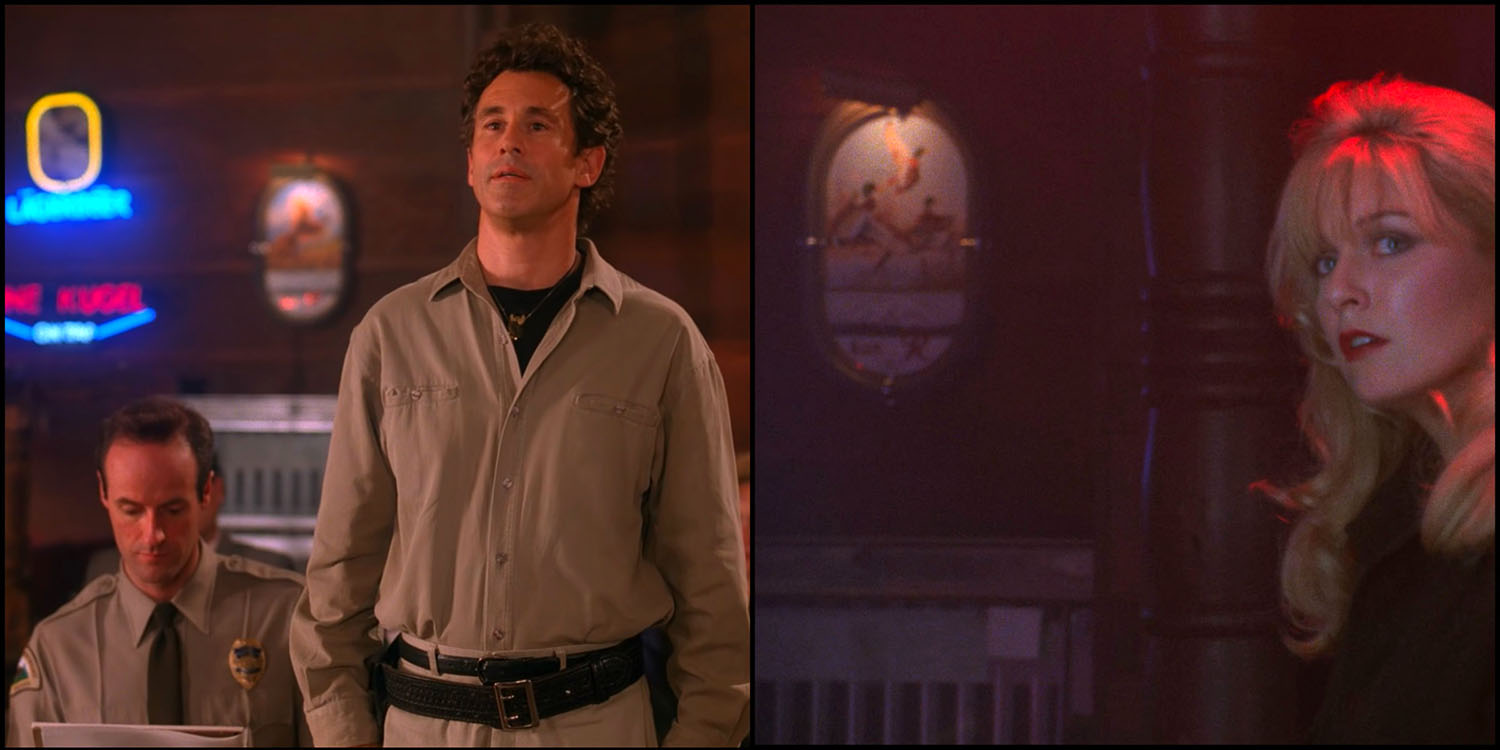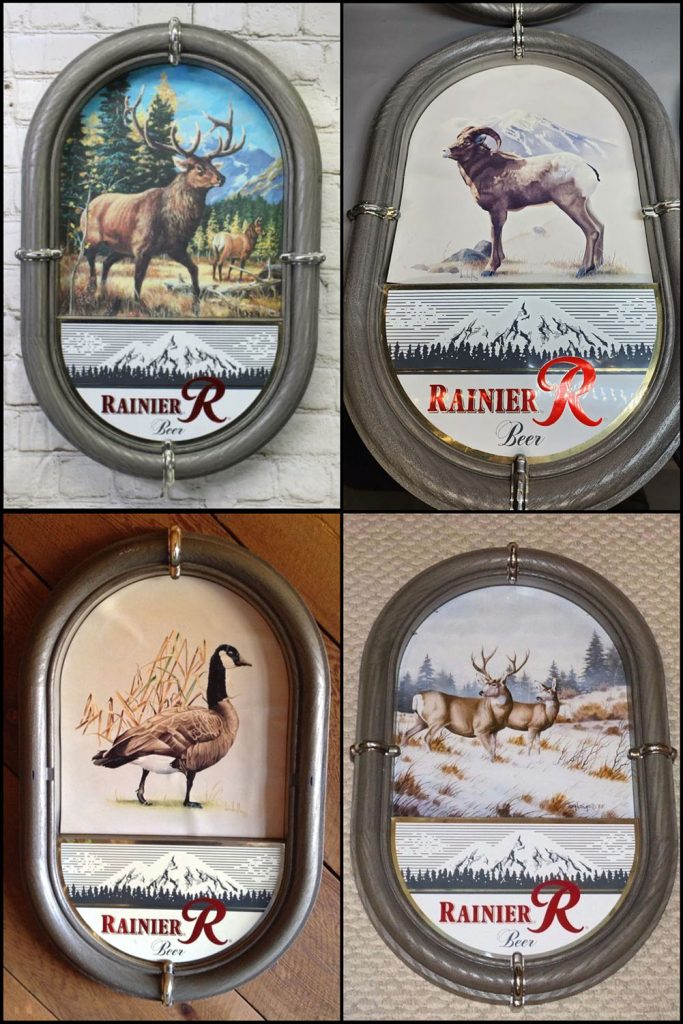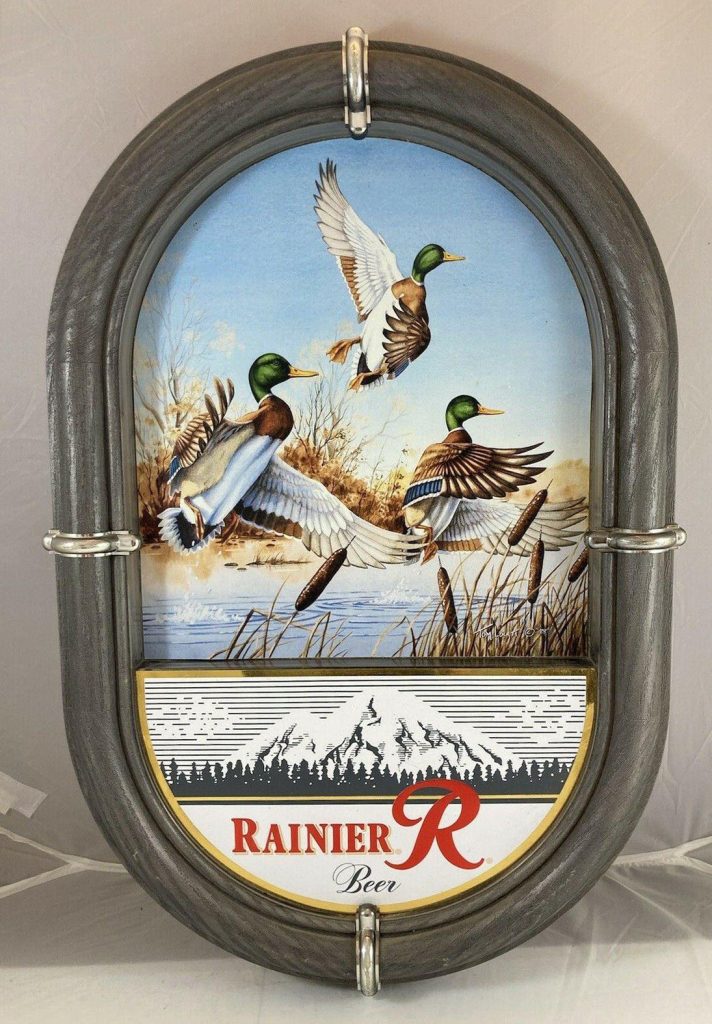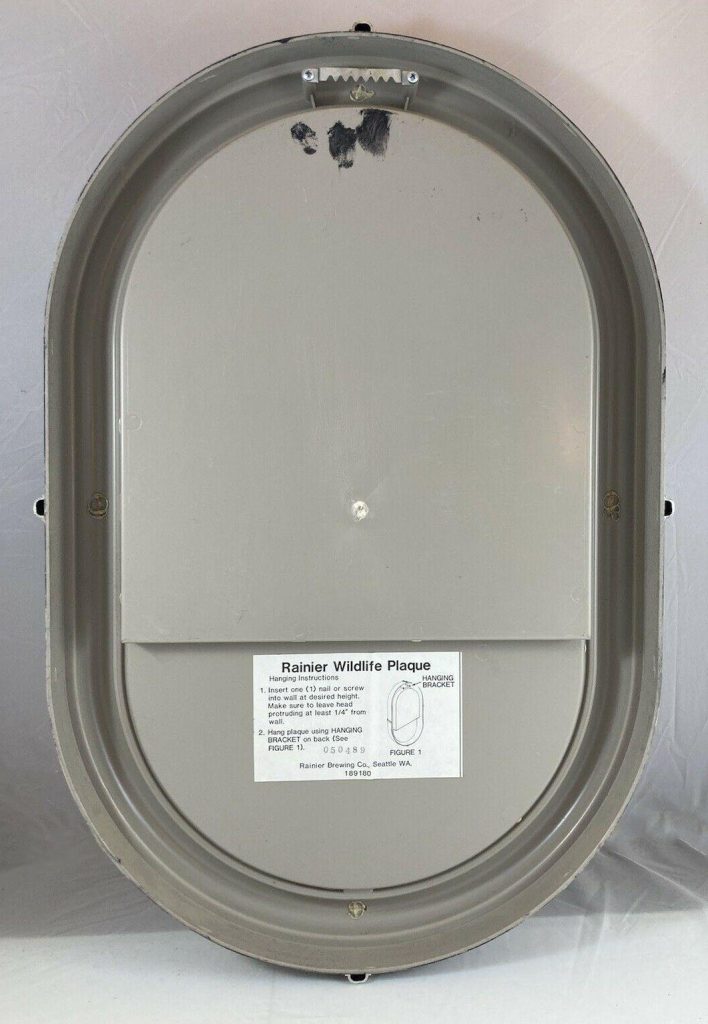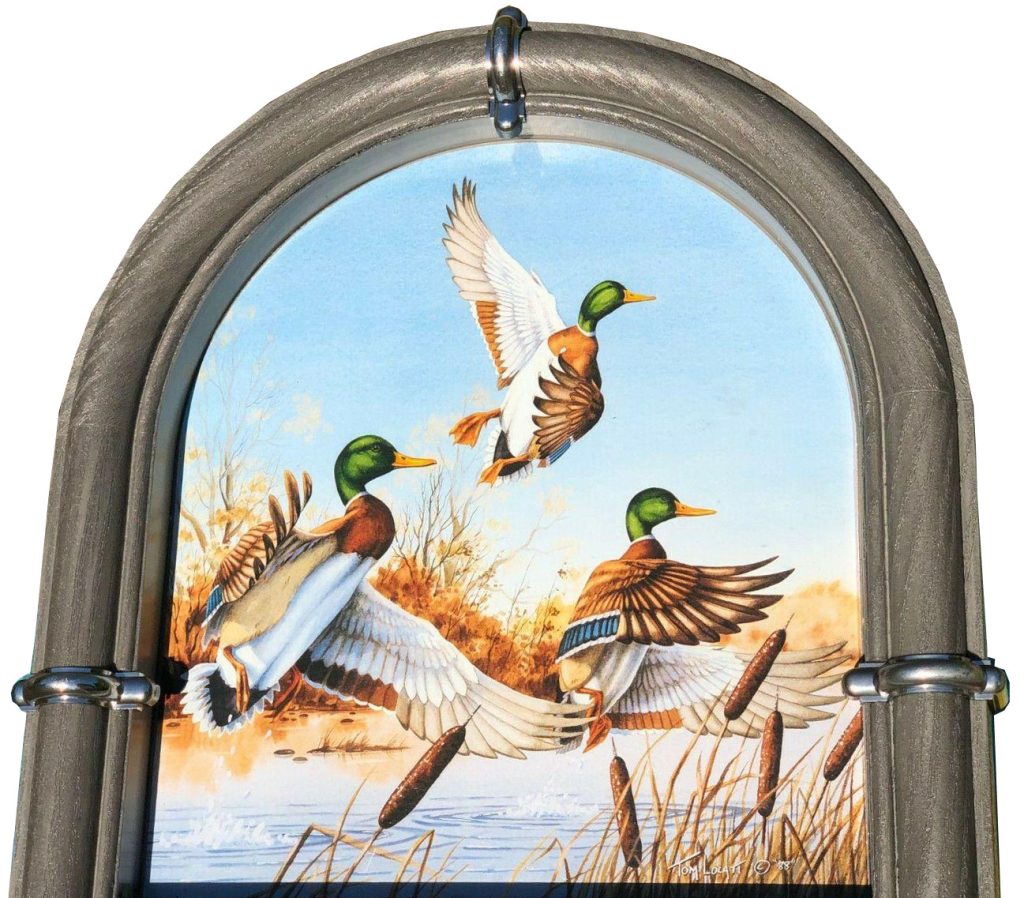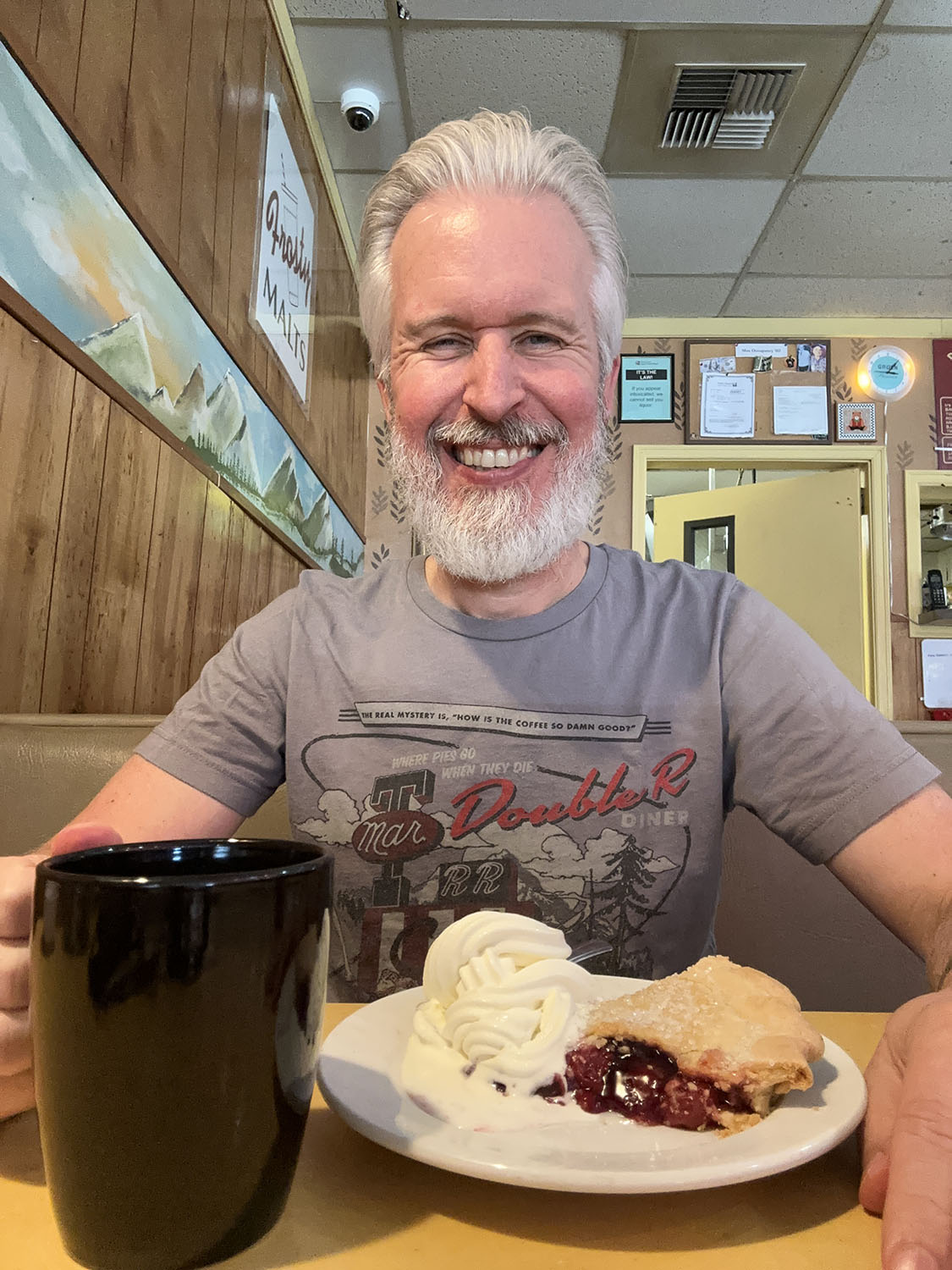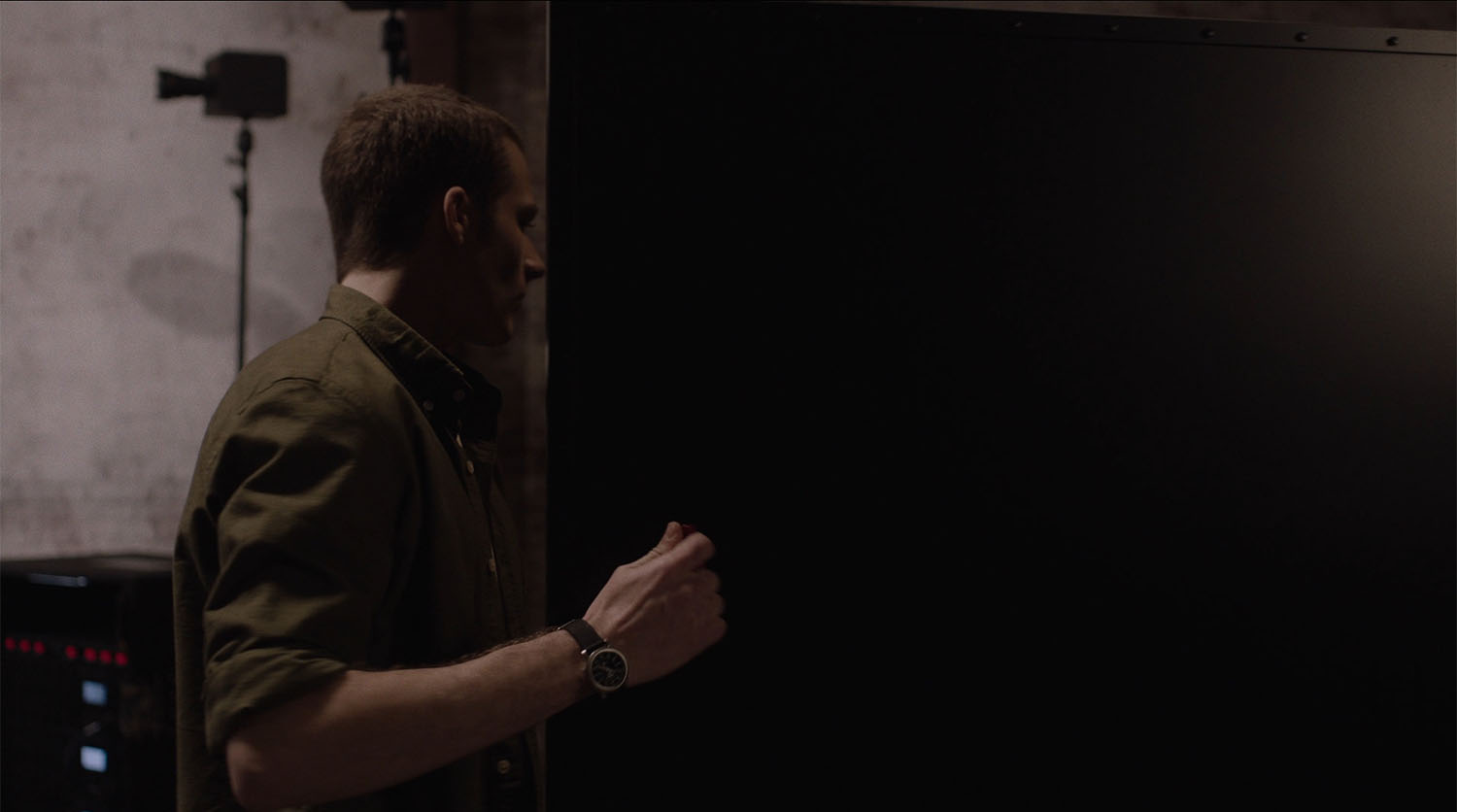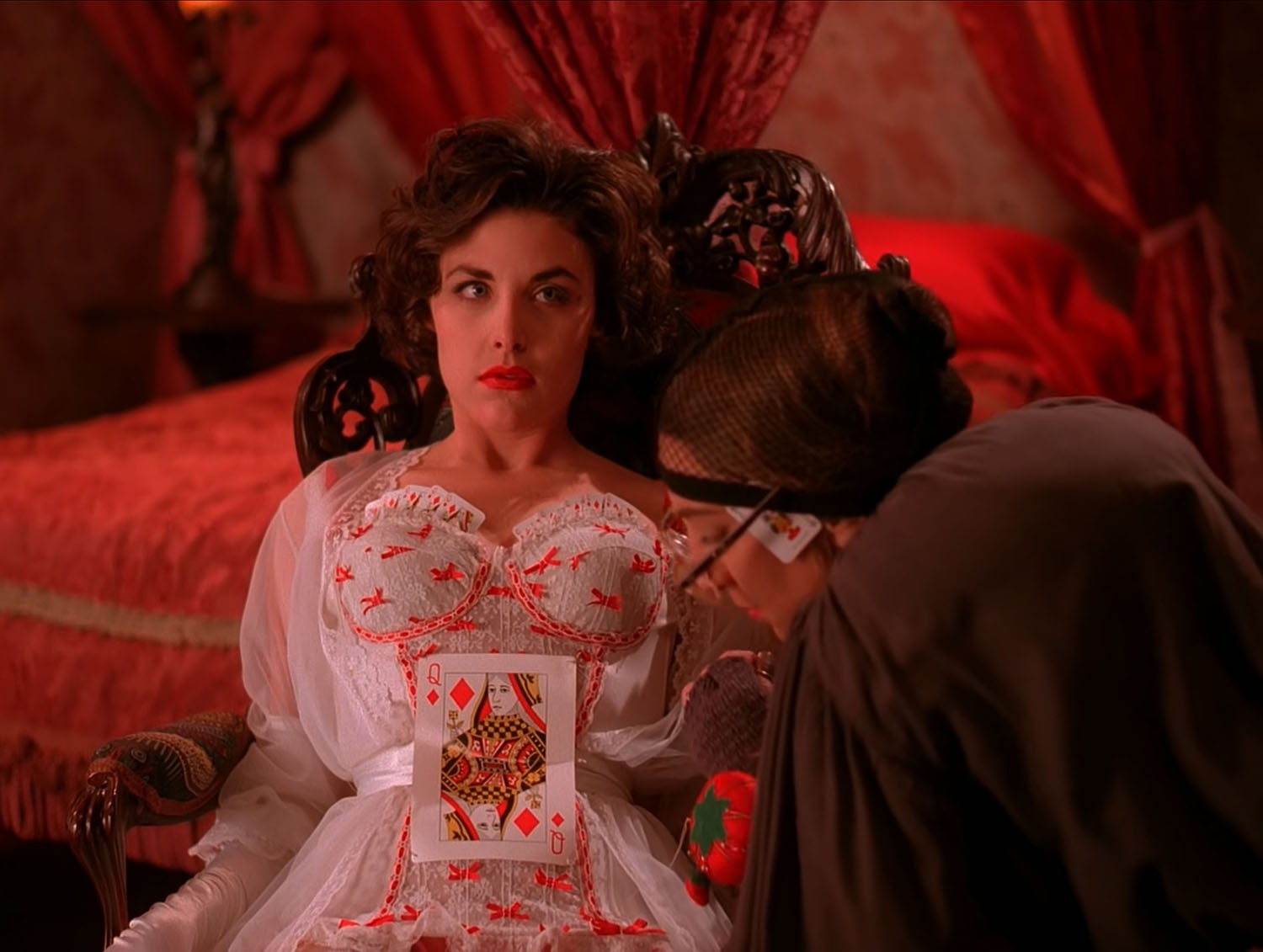I’d like to think the official beer of Twin Peaks is Rainier Beer. At the time the first two seasons and David Lynch’s feature film were made, the taps were still flowing at the Washington state brewery. Today, the Rainier brand is owned and operated by Pabst Brewing Company and the beer is produced in California. Yet there are still traces of Rainier Brewing found throughout the series, including two different wildlife plaques at The Roadhouse.
BRIEF HISTORY OF RAINIER BEER
A.B. Rabbeson opened Washington Brewery, which was Seattle’s first commercial brewing company in 1854. He renamed his brewery Seattle Brewery a few years later 1872 and began producing Rainier beer in 1878.
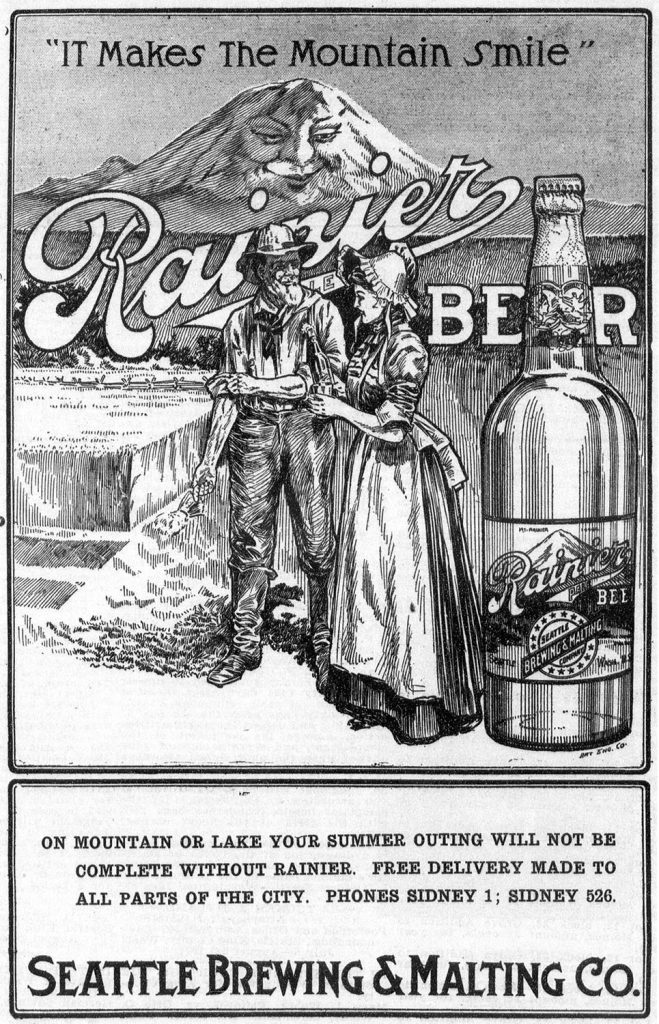
Ten year later, Rabbeson sold his brewery, along with the Rainier brand, Andrew Hemrich who had founded Bay View Brewing Company in 1883. Hemrich merged three different breweries and rebranded the company to Seattle Brewing & Malting Company. He would served as president until his death in 1910. His brother Louis continued manufacturing Rainer Beer in Washington until 1916 when the state enacted its own prohibition, four years before the 18th amendment enacted the nationwide prohibition of alcohol. Production was moved to San Francisco, California until the amendments repeal a few years later.
In 1935, Alberta brewers Fritz and Emil Sick repurchased the Rainier brand and began brewing again in Washington state. Between 1935-1977, the brewery went through several name changes, such as Sicks’ Seattle Brewing and Malting and Sicks’ Rainier Brewing Company.
The Rainier Brewery was sold again in 1977, this time to G. Heileman Brewing Company. Ten years later in September 1987, Bond Brewing of Australia acquired the company. The new owner discontinued a rather popular series of Rainer Beer television commercials which you can read about on HistoryLink.org.
A look back at these iconic commercials from Rainier Beer was assembled in to a documentary by Director Isaac Olsen titled Rainier: A Beer Odyssey. As an aside, the North Bend Theatre in North Bend, Washington will be screening this film from January 23-26, 2025.
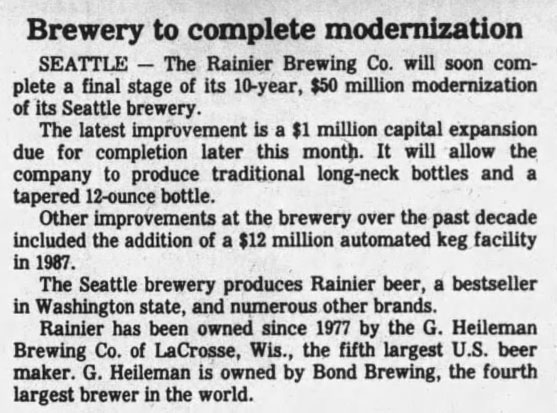
A year later, the company completed a 10-year, $50-million modernization of its Seattle brewery. This investment allowed the company to produce traditional long-neck bottles and a tapered 12-ouch bottle. Before the upgrade, the amber-colored Rainer Beer bottles were more squatty, something akin to a stubby or stubbie.
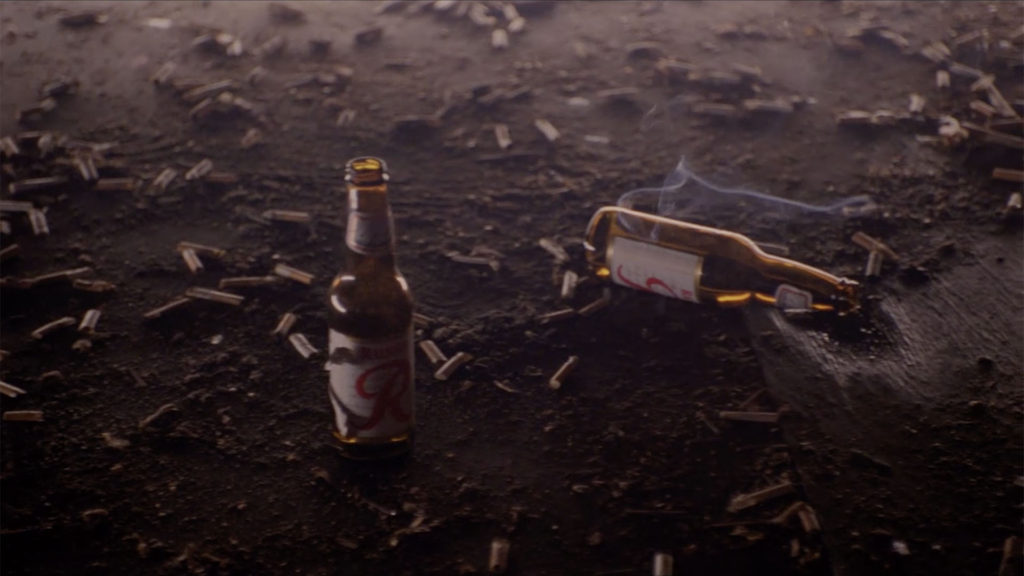
Without the brewery’s modernization investment, this brief transition scene in Twin Peaks: Fire Walk With Me may have looked a little different.
By 1991, a Dallas investment firm, Hicks, Muse & Co., purchased the brewery from Bond Brewing in 1993. At the time, they were heavily in debt and faced bankruptcy. Three years later, it was sold again to Stroh Brewing Company before winding up owned by Pabst, which closed the brewery in 1999.
Rainier Beer, however, would make its first appearance in Twin Peaks during the second season with an oval shaped beer sign hanging in The Roadhouse.
RAINIER WILDLIFE PLAQUES AT THE ROADHOUSE IN TWIN PEAKS
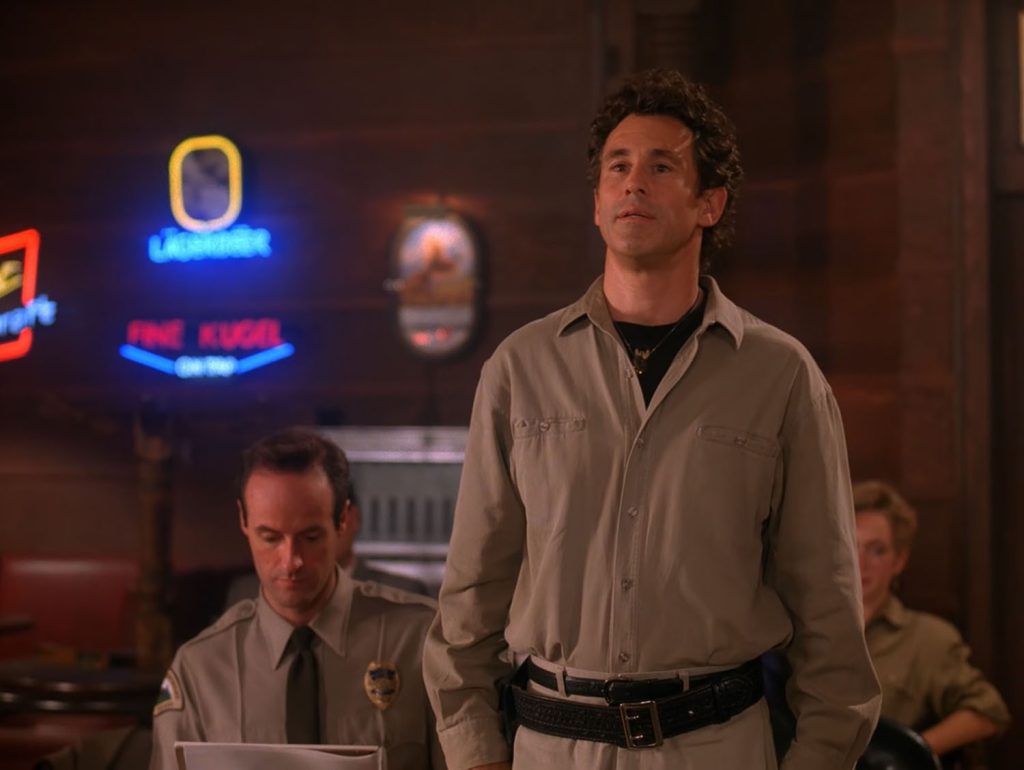
When Judge Sternwood holds court at The Roadhouse, we catch a slightly out-of-focus look at an oval-shaped beer sign as Sheriff Harry S. Truman addresses the court about Leland Palmer’s character.

Despite the slightly fuzzy image, it was easy to locate a match based on the shape of the pheasant and the colors used in the artwork.
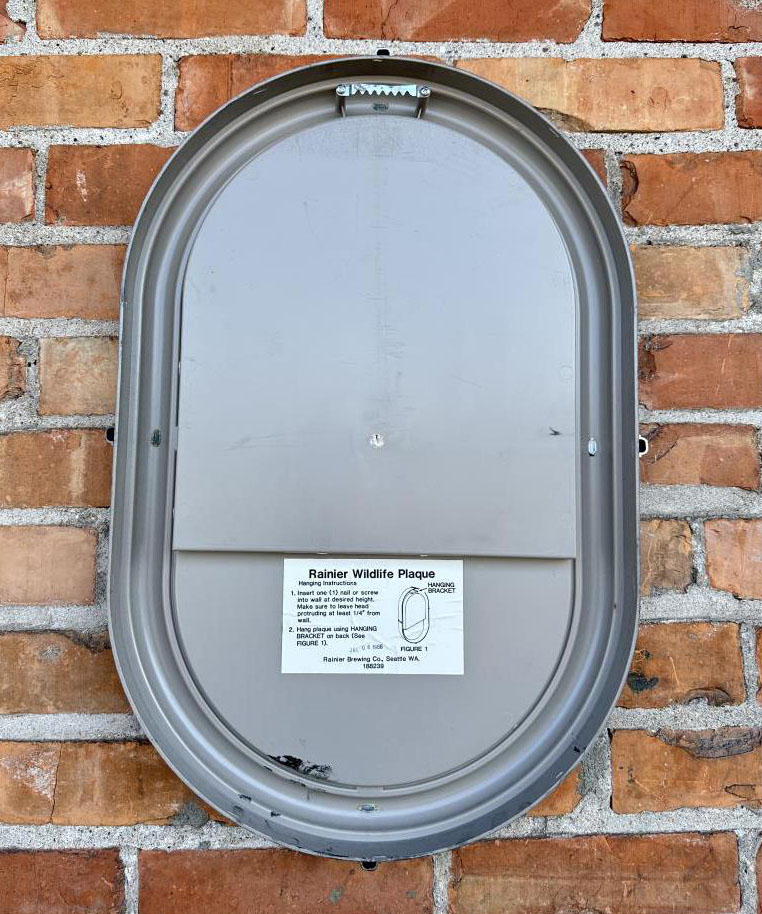
The plastic beer sign measures 14 5/8-inches by 22 1/8-inches. A metal hanging bracket is included on the back of the wildlife plaque.
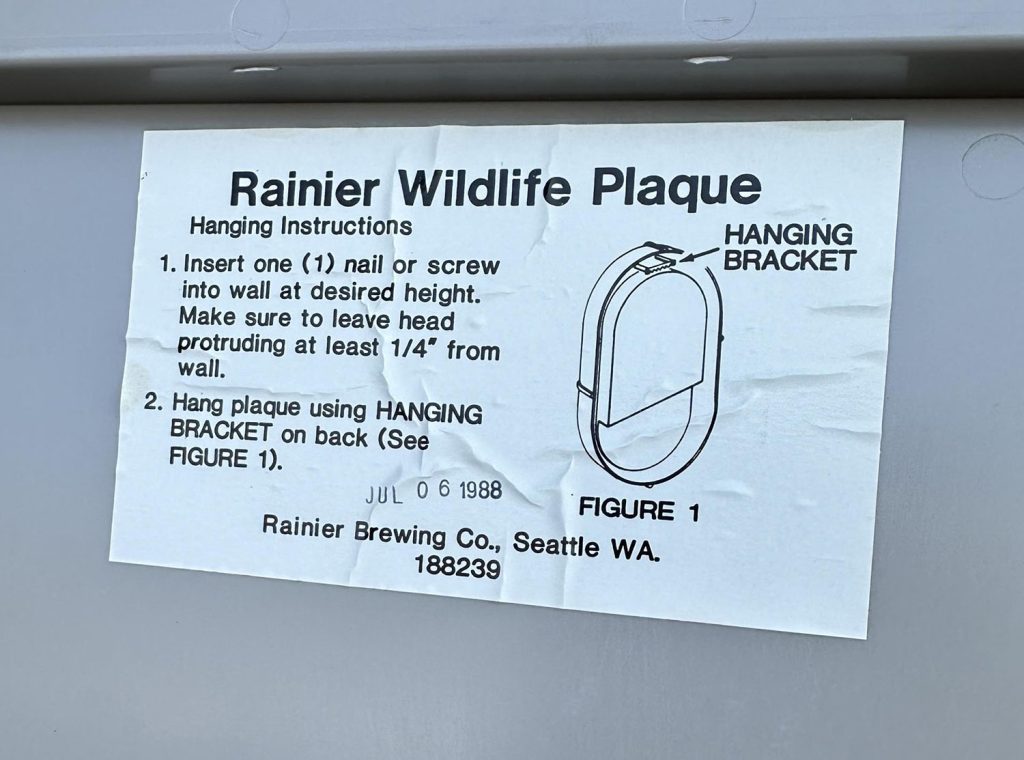
The hanging instructions on the back date this wall plaque to July 6, 1988, Rainier Brewing Co., Seattle, WA., 188239.
Despite exhaustive research, I was unable to determine if this was part of a specifically named campaign. Yet with the knowledge that Bond Brewing purchased the brewery in 1987, this was most likely their attempt at establishing a connection to local outdoor sports and wildlife in Washington state.
Other examples of these oval-shaped beer signs include artwork of elk, deer and other Pacific Northwest wildlife. These signs were produced between 1988-1990.
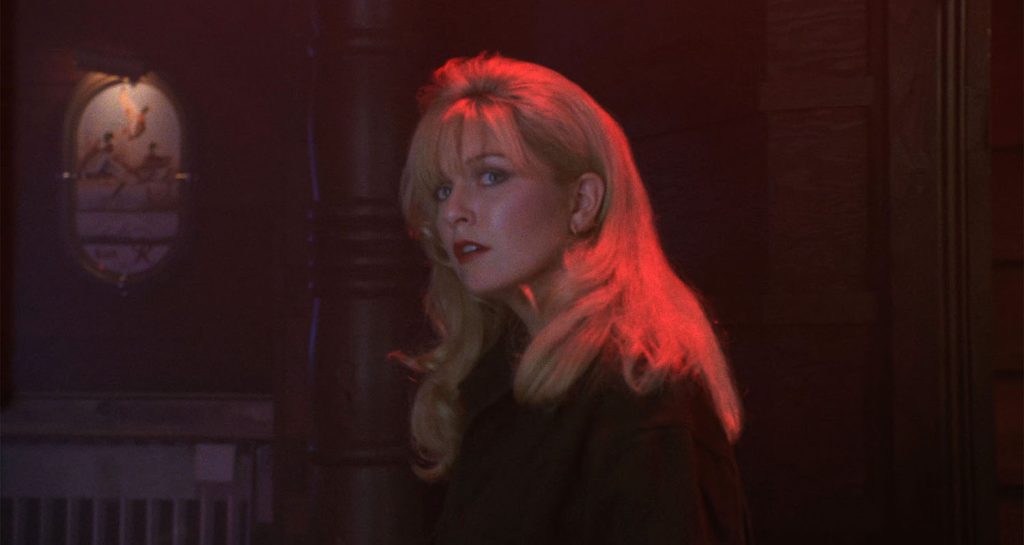
By David Lynch’s 1992 feature film, the Rainier Beer sign had changed from pheasant artwork to an image of three mallards by Montana-based artist Tom Locati. You can best see this sign as Laura Palmer enters The Roadhouse while Julee Cruise sings “Questions in a World of Blue.”
My fellow Bookhouse Boy and digital archeologist Matthew Haywood spotted this sign and found the match. He noticed that part of the “Rainier” name was covered in the film, a practice done by set decorators and prop masters to hide the brand name of an item. He shared the identified sign with me and I immediately recognized the giant red “R.”
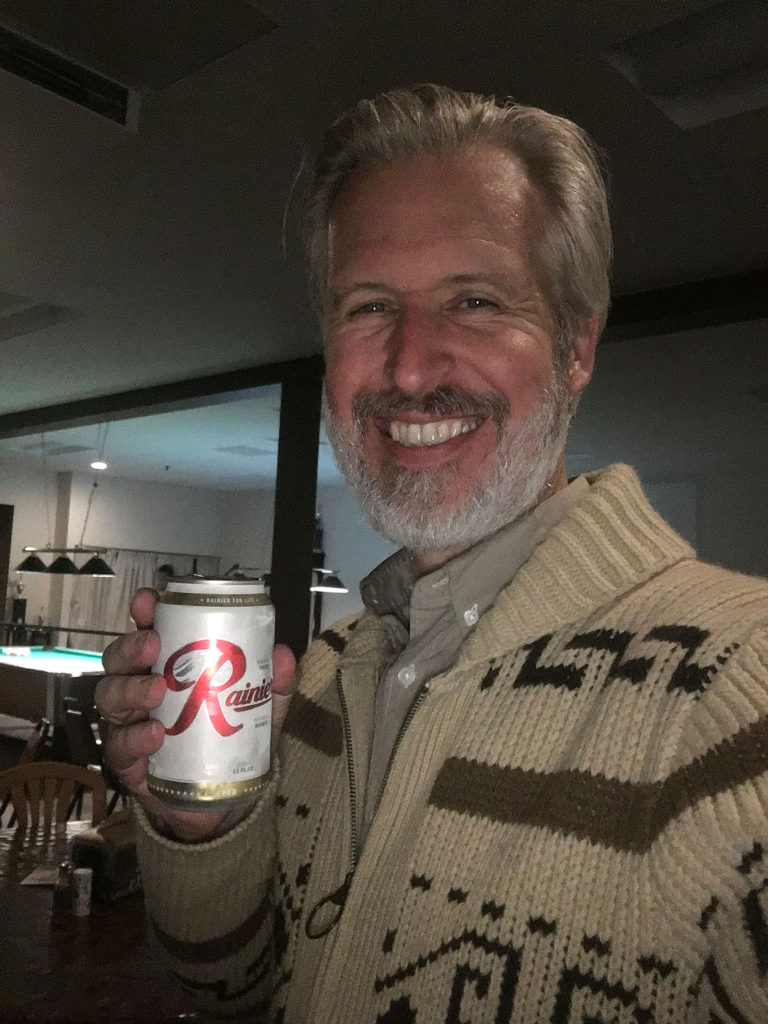
With every visit to Washington state, I typically find myself enjoying a can or two of Rainier Beer. I even bring an extra suitcase to bring some home to Florida. While I know it’s not the same as the beer from the early 1990s, I pretend I’m living in the Twin Peaks with every sip.
This plastic oval sign was dated from May 4, 1989 according to the hanging instructions on the back.
A closer look at the mallard artwork revealed an artist’s signature – Tom Locati, “88.” This name appeared on a few different Rainier Beer plaques produced during this time. Finding information, however, about Locati was a rather interesting task.
WHO IS ARTIST TOM LOCATI?
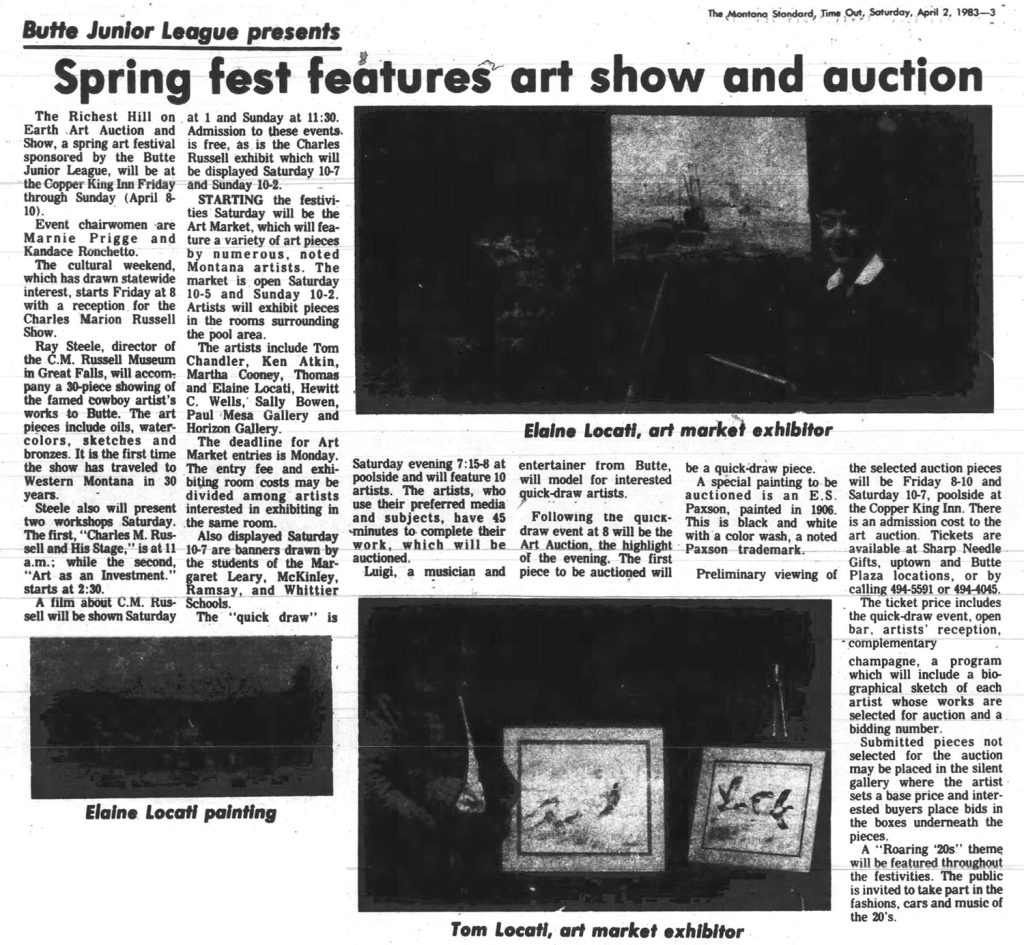
The earliest reference I could find about artist Tom Locati comes from an April 2, 1983 article in The Montana Standard. While the image of Locati is very dark, you can see him standing next to two wildlife paintings. I believe he was a 1977 graduate of Billings Central Catholic High School.
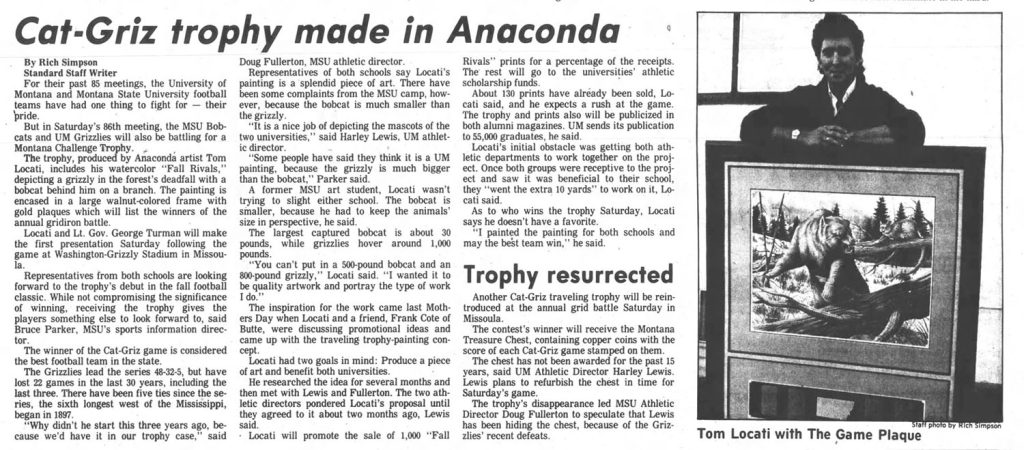
In the early-to-mid 1980s, Locati was living in Anaconda, Montana. In 1986, he was commissioned to create a “Game Plaque” for the winner of the University of Montana and Montana State University football game. This trophy included artwork by Locati titled “Fall Rivals” and was presented to the winner of the fourth oldest college football rivalry. That year, the teams played for the first time in the new Washington-Grizzly Stadium on October 25, where the University of Montana beat Montana State 59-28.
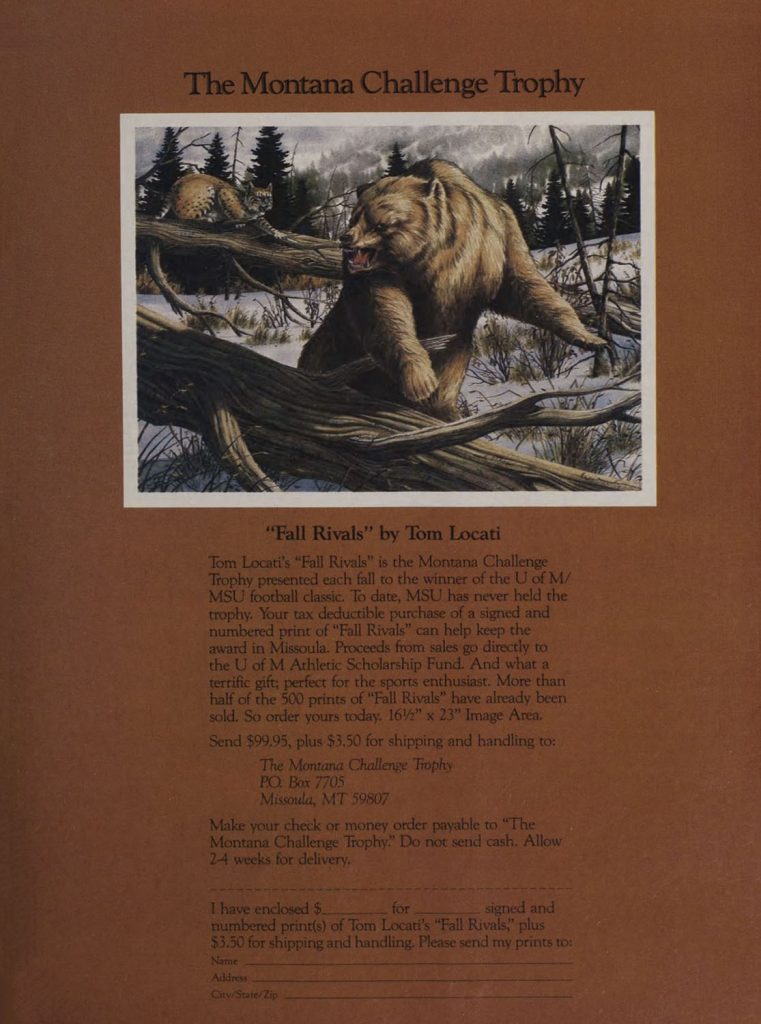
Fans of the “Brawl of the Wild” could order Locati’s artwork created for the Montana Challenge Trophy. This trophy would be replaced years later with a three feet tall sculpture depicting a bobcat and grizzly clawing for a football.
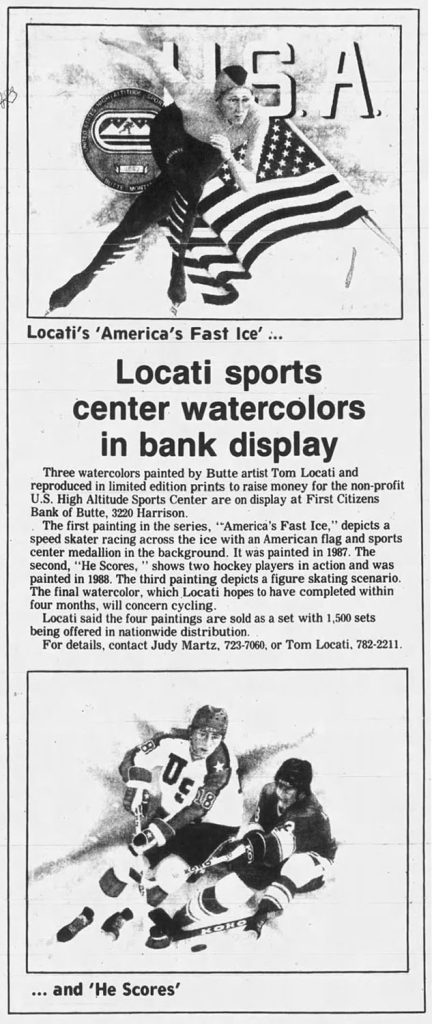
By 1989, Locati was living in Butte, Montana (BUTTE!!) where he created sports themed artwork to raise money for the nonprofit organization, U.S. High Altitude Sports Center. After this year, his work seems to disappear in newspapers. Today, I believe his is a real estate agent living in Scottsdale, Arizona. There is no mention of his artwork on his real estate website, but his appearance today seems to match his 1986 newspaper photo.
APPEARANCES OF RAINIER BEER SIGNS IN TWIN PEAKS
Here is a look at where these two Rainier Beer signs appear throughout the show’s second season and briefly in the feature film.
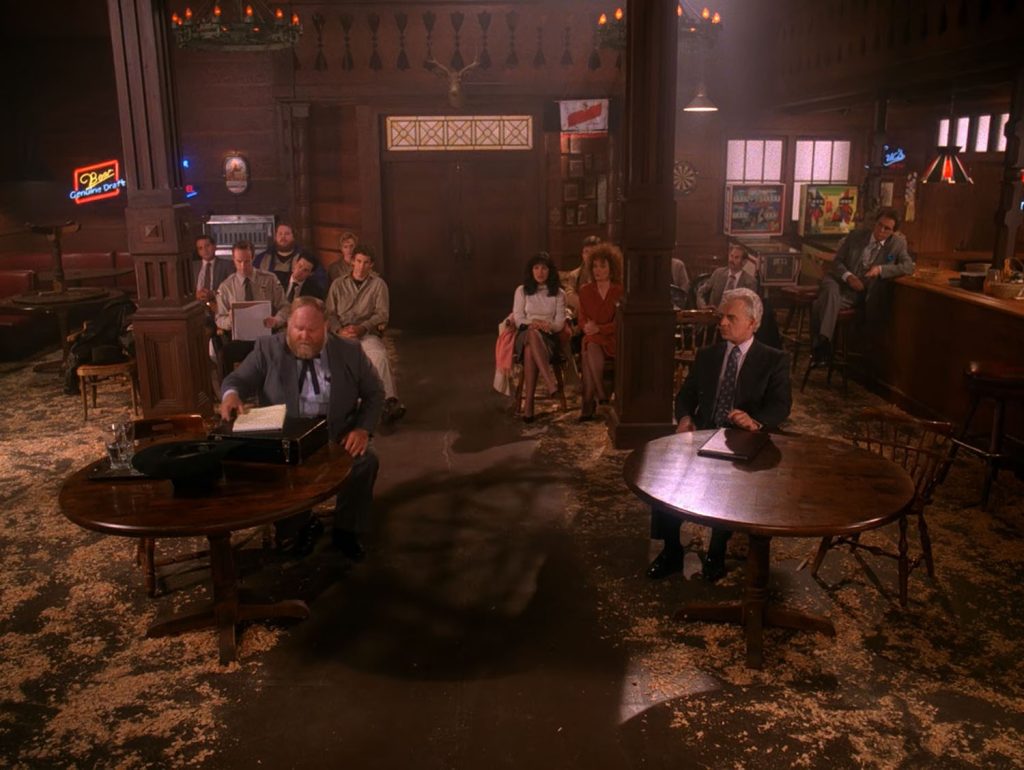
The first time we see the beer sign is in Twin Peaks episode 2.005 when the interior was turned into Judge Sternwood’s courtroom.
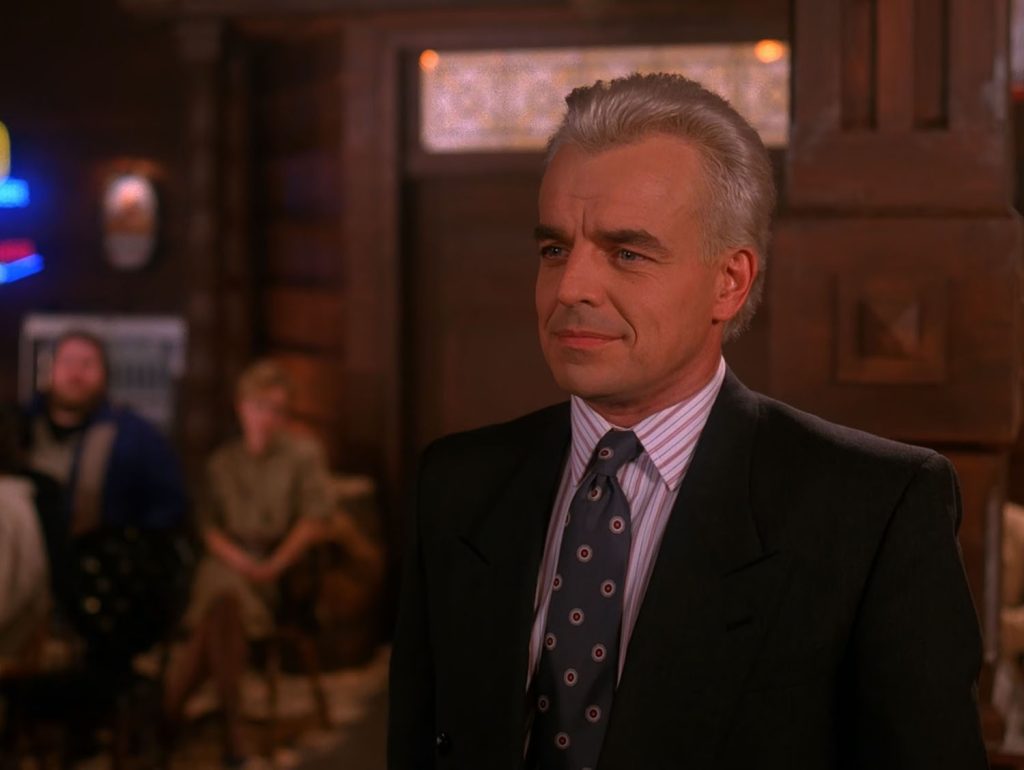
An out-of-focus sign is seen behind Leland Palmer as he stands at the request of Judge Sternwood.

Later in the episode, we return to the Roadhouse-turned-courtroom for Leo Johnson’s trial.
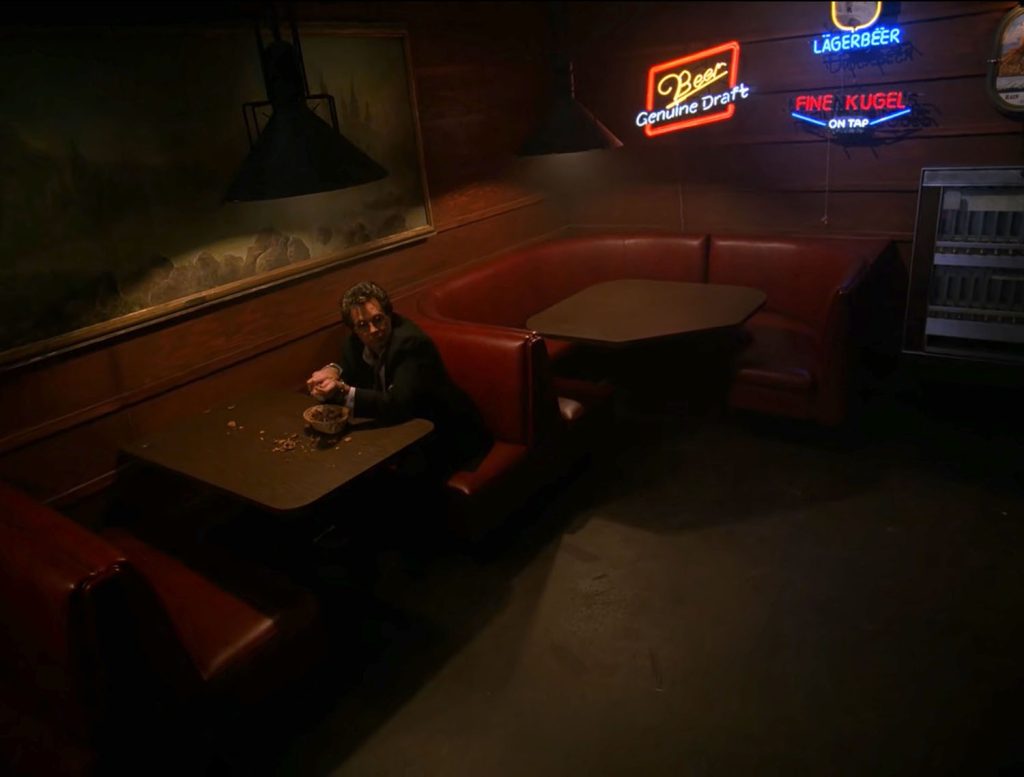
The corner of the sign is seen in Twin Peaks episode 2.009 as Ben Horne sits in a booth eating nuts.

I combined a panning shot of the Roadhouse interior to create the panoramic image above. The sign is seen above the cigarette dispenser, next to the neon beer signs.
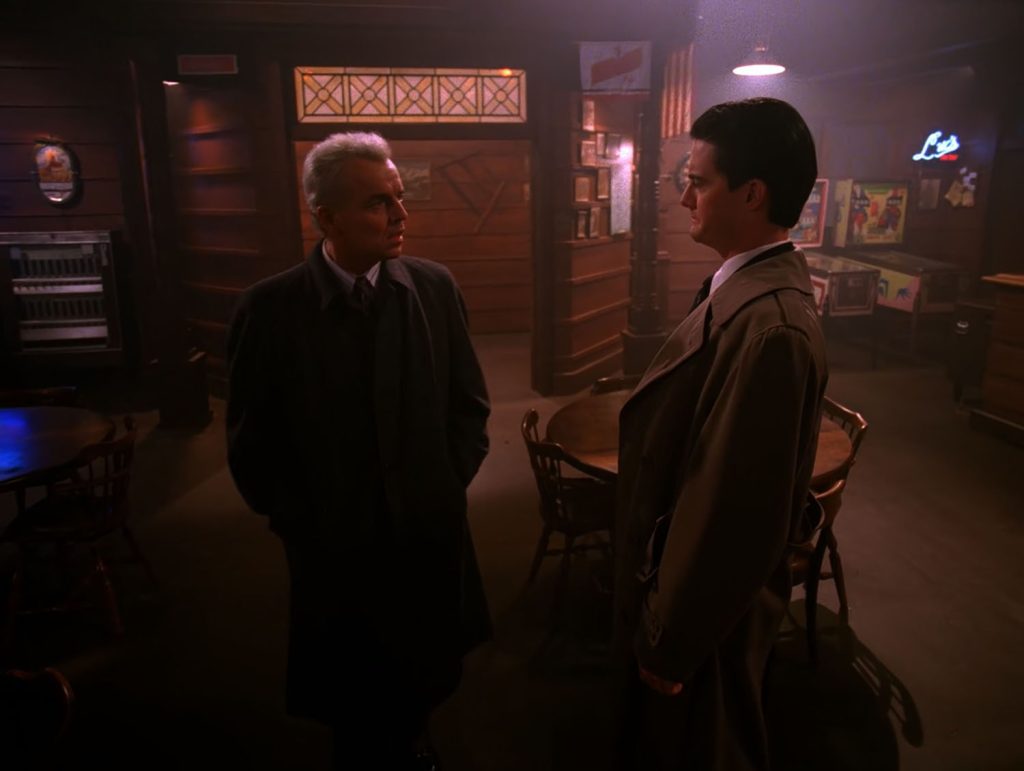
When Leland Palmer enters the Roadhouse, he stops to speak with Agent Cooper. The sign is seen to the left of the image.
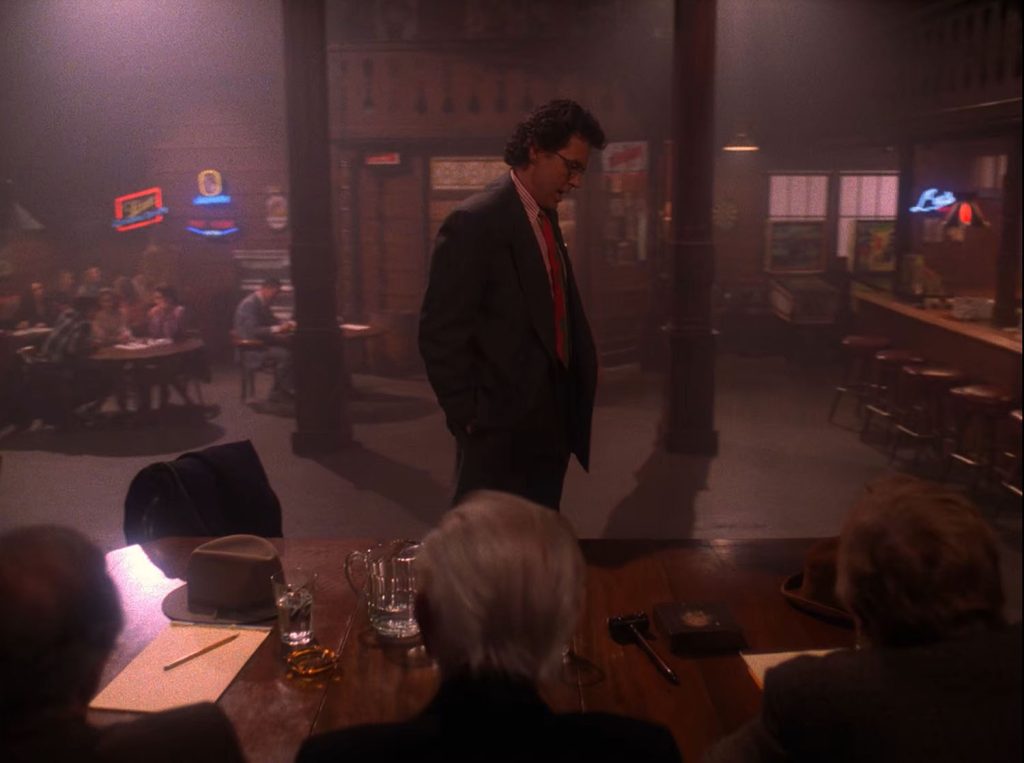
In a blink and you’ll miss it moment from Twin Peaks episode 2.019, the sign is visible as Ben Horne addresses the Miss Twin Peaks committee.
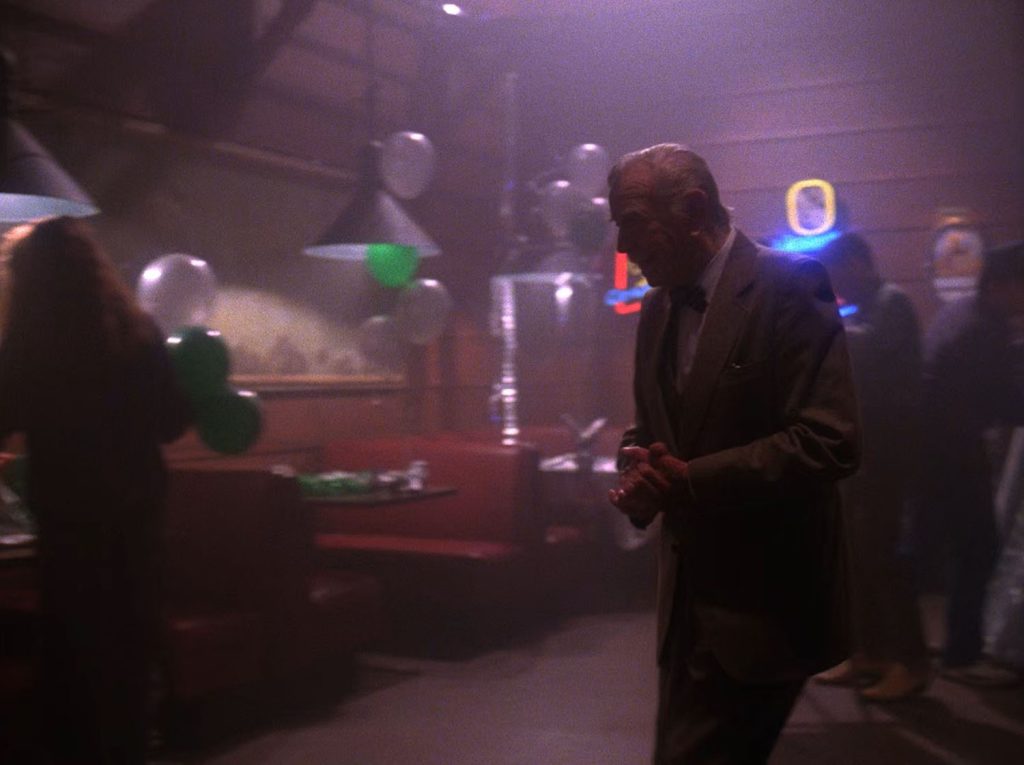
In the next episode, we catch a very quick glimpse as Mayor Milford is seen crossing the Roadhouse.
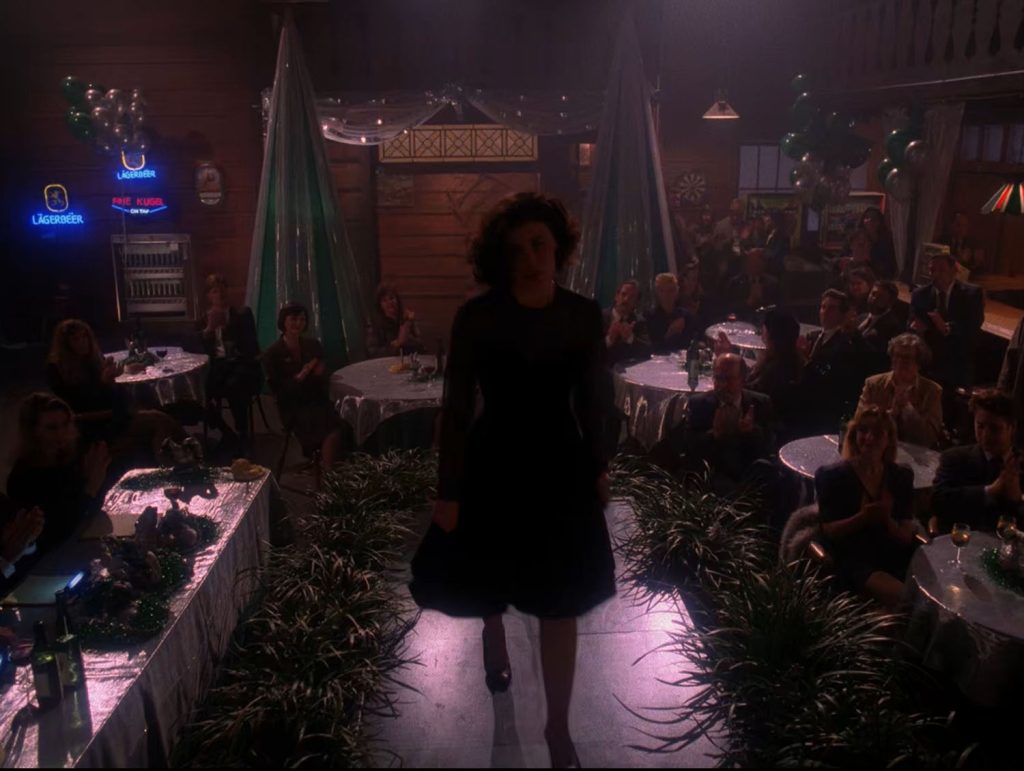
In the penultimate episode of the second season, the sign is visible as Audrey Horne leaves the stage after delivering her Miss Twin Peaks speech.
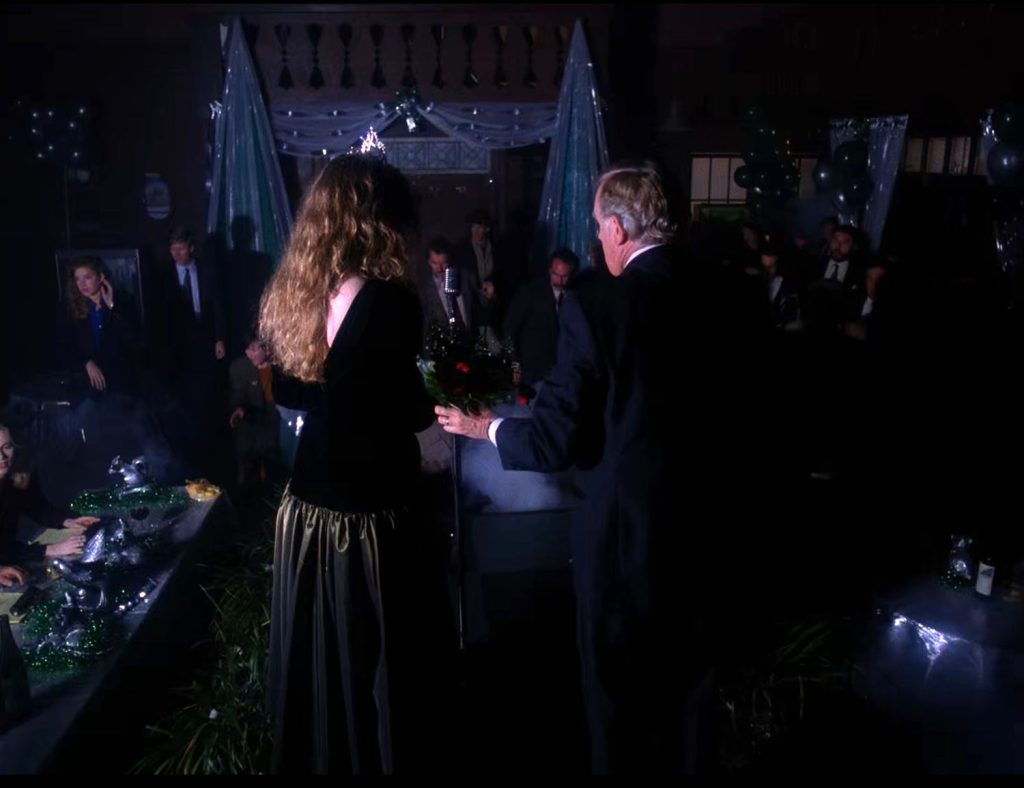
Doc Hayward and Annie Blackburn are on stage as the lights begin strobing throughout the Roadhouse. You can spot the sign in between the flashes.
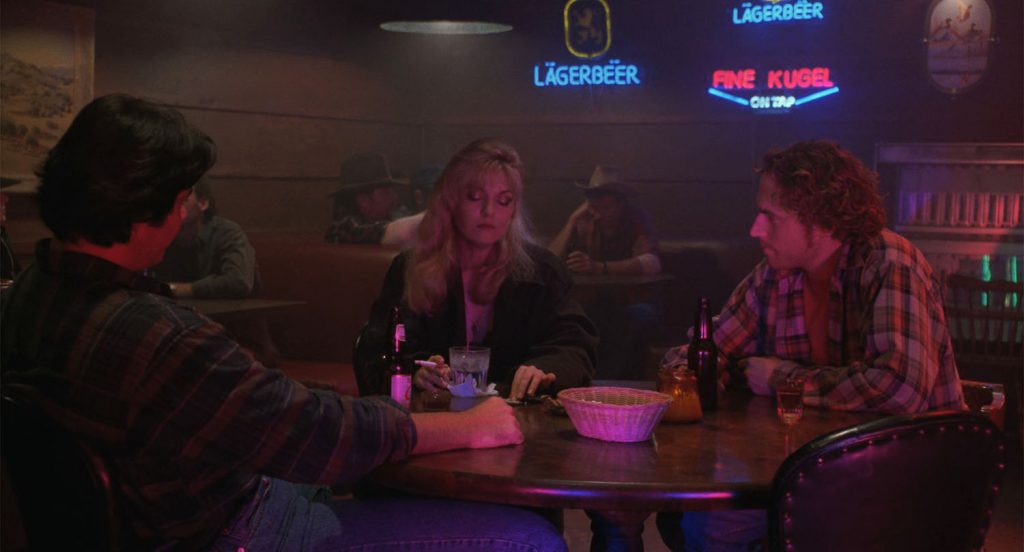
In the 1992 feature film, the mallard sign is visible both when Laura Palmer enters the Roadhouse and when she is seen talking with Buck and Tommy at one of the round tables.
You can see even more identified props and other set decor by visiting this ever growing catalog of items on Twin Peaks Blog. Thank you again to Matthew for his assistance with finding and identifying these set decorations.
Discover more from TWIN PEAKS BLOG
Subscribe to get the latest posts sent to your email.

